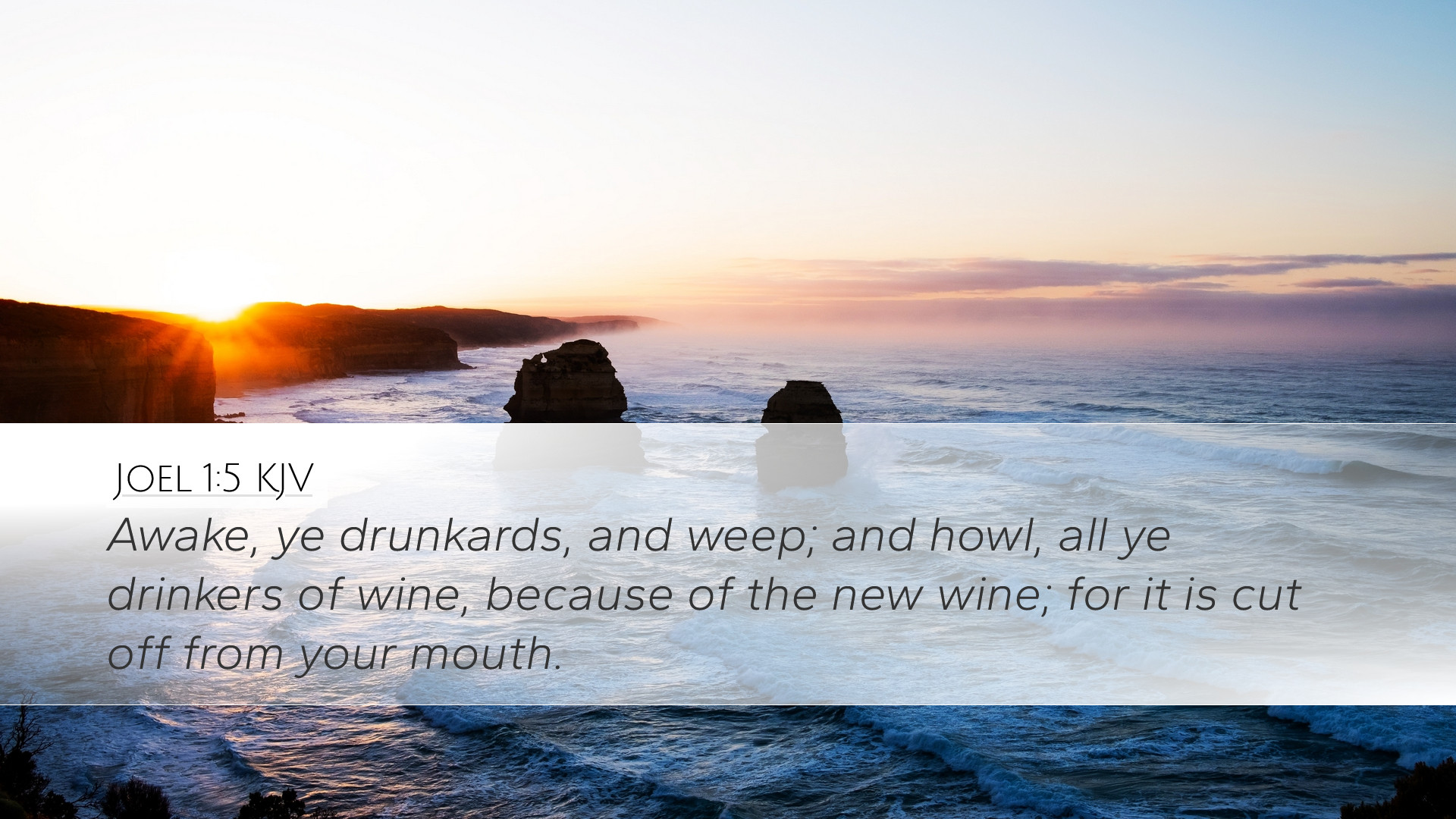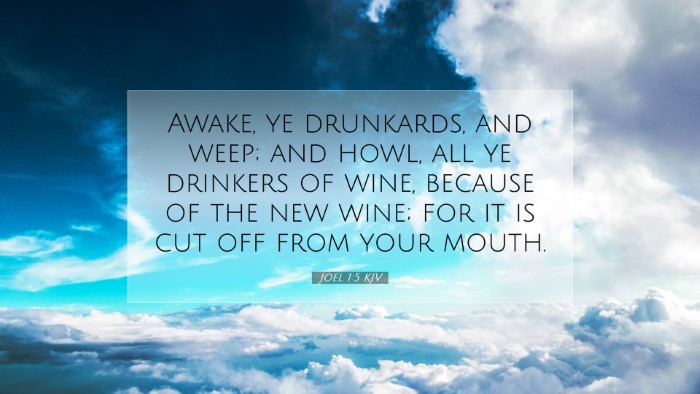Old Testament
Genesis Exodus Leviticus Numbers Deuteronomy Joshua Judges Ruth 1 Samuel 2 Samuel 1 Kings 2 Kings 1 Chronicles 2 Chronicles Ezra Nehemiah Esther Job Psalms Proverbs Ecclesiastes Song of Solomon Isaiah Jeremiah Lamentations Ezekiel Daniel Hosea Joel Amos Obadiah Jonah Micah Nahum Habakkuk Zephaniah Haggai Zechariah MalachiJoel 1:5
Joel 1:5 KJV
Awake, ye drunkards, and weep; and howl, all ye drinkers of wine, because of the new wine; for it is cut off from your mouth.
Joel 1:5 Bible Commentary
Commentary on Joel 1:5
Joel 1:5 states: "Awake, ye drunkards, and weep; and howl, all ye drinkers of wine, because of the new wine; for it is cut off from your mouth." This verse encapsulates a significant call to repentance for the people of Judah, highlighting themes of judgment, sorrow, and a return to spiritual sobriety.
Contextual Overview
The Book of Joel is a prophetic text attributed to the prophet Joel, addressing the people of Judah during a time of severe locust plague and drought. The devastation serves as a prelude to a series of divine judgments, bringing forth an urgent call to repentance.
Insights from Matthew Henry
Matthew Henry emphasizes the severe consequences of sin reflected in the natural calamities affecting the land. In his commentary, he notes:
- Awakening from Spiritual Slumber: The verse opens with a command to awake, underscoring the need for the people to rouse from their complacency and heed the seriousness of their situation.
- Drunkenness as Symbolism: Henry interprets drunkenness not just in a literal sense, but as a metaphor for moral and spiritual inebriation, indicating a lack of awareness regarding their sinfulness and the impending judgment.
- Call to Sorrow: The emphasis on weeping and howling reflects the gravity of the situation, calling them to mourn over their sins and the loss of blessings (i.e., the new wine).
Insights from Albert Barnes
Albert Barnes provides an exegetical insight that elaborates on the wine context and the plight of the people:
- Desolation of Resources: Barnes highlights that the cutting off of new wine symbolizes the loss of joy and abundance that the people once enjoyed. This is significant as wine often represents joy and prosperity in biblical literature.
- Exhortation to the Intoxicated: His examination includes the view that the drunkards, as representative of the unawakened masses, are called to recognize their condition and its implications, thus addressing their spiritual insensitivity.
- Divine Judgment: Barnes asserts that the call to wail stems from acknowledgment that the calamity is a direct consequence of divine judgment against the sins of the nation.
Insights from Adam Clarke
Adam Clarke brings in historical and practical dimensions to the commentary:
- Cultural Context of Drunkenness: Clarke points out the social implications of drunkenness in ancient times, where it often led to a loss of dignity and self-control, which he parallels with spiritual decline.
- Repentance as a Key Theme: Clarke elaborates on the necessity of genuine repentance as a response to both personal and national calamity.
- Prophetic Urgency: He notes that the urgency of Joel's call reflects a deeper prophetic concern for the moral and spiritual fabric of society, which could be mirrored in today’s context.
Theological Reflections
This verse invites theological reflection on the nature of repentance, the effects of sin, and the call to a sober spiritual life. As pastors and theologians examine these themes, they may consider:
- The State of the Church Today: Reflect on issues of moral complacency among congregants and the importance of preaching messages that awaken spiritual urgency.
- Symbolism of Wine: Discuss the role of alcohol in contemporary society and how it can detract from spiritual stewardship.
- Calls to Repentance: Foster a culture within communities that encourages accountability and invites individuals to acknowledge their spiritual shortcomings.
Conclusions
Joel 1:5 serves as a profound reminder of the need for awareness in the face of divine judgment. The words of the prophet echo through the ages, urging believers to remain vigilant, repentant, and responsive to God’s revelations in their lives. By synthesizing insights from prominent public domain commentaries, we gain a multi-faceted understanding of scripture that can guide modern followers in their faith journeys.


